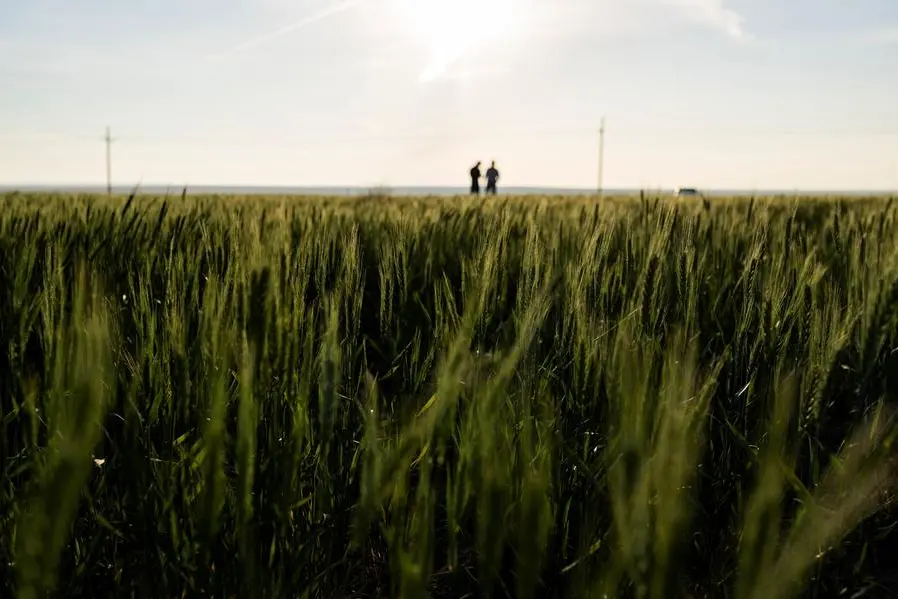PHOTO
In a tiny town surrounded by miles of rippling wheat fields, Brady Peterson's restaurant sits nearly empty during what should be a Saturday lunch rush. Normally, Pete's would be filled with farmers ordering fried chicken and cheeseburgers, but as farm income thins, so does Peterson's business.
Sluggish sales have slashed his income so much that he can't afford to run his home air conditioner during the baking Kansas summers or pay for a suit to wear to a close friend's funeral.
"I ended up wearing a T-shirt I wear to work and a nice pair of jeans," Peterson said.
As U.S. farm incomes are forecast to plunge in 2024 due to a sharp reversal in commodity crop prices, less government support and high borrowing and labor costs, farmers' economic pain is spreading from the fields to Main Street.
The situation in U.S. prairie states is particularly severe. Farmers here are facing the worst economic situation in over a decade, and small cities are at risk of becoming ghost towns, sources told Reuters. Two years of severe drought followed by national farm economic problems including inflated seed and chemical costs, higher interest rates and lower crop prices have sapped money from the surrounding communities, ten business owners, two chambers of commerce directors, two economists and three farmers in Kansas told Reuters. Business owners noted anywhere from a 20% to 30% decline in revenue compared to the previous year. Nationally, farm income is forecast to fall 25% from last year according to the U.S. Agriculture Department. That would be the largest annual decrease in dollar terms.
"We're a farming community, and the farmers just don't have the money to spend," Megan Jensen, owner of Meg's Grooming and Pet Salon in Concordia, Kansas, said through tears. "Every penny I own is invested in this. If I fail, I'm homeless." U.S. farm income hit a record high in 2022, before a steep drop in commodity crop prices due to large harvests in South America and waning demand from importers and meatpackers upended U.S. farmers' fortunes. Corn, soy and wheat futures are trading around three-year lows. Farm income in Kansas and other prairie states has fallen even more and is forecast to be the lowest since at least 2010 this year, according to U.S. Department of Agriculture data. Kansas is the biggest U.S. wheat-producing state, and economists say the nationwide downturn has particularly hurt regions that produce the grain as demand for U.S. wheat shrinks.
FEAST OR FAMINE
The mayor of Smith Center, Bryce Wiehl, is a tanned farmer with a scraggly white beard and gruff voice. Over fried chicken at Pete's, he described the foreclosures, the town of 1,500's dwindling population and downward economic spiral.
"It's hard to find an industry that doesn't rely on farm product prices. It has a dramatic impact on the community," he said.
Rural downtowns in Kansas are dotted with shuttered businesses, and residents noted the streets are emptier than ever.
"Things are incredibly volatile here. It's either feast or famine," said Shane Wyatt, owner of a gun shop in rural Norton, Kansas. "I wouldn't quite call it a ghost town, but you can really see the impact of the low prices." While the broader U.S. economy is growing strong, researchers at Creighton University reported in May that the nation's rural Main Street economy in the Midwest and Great Plains had fallen as farm equipment sales slumped and agricultural land prices dropped for the first time in five years.
Russ Erbert, a jeweler in Norton, Kansas, delights in showing young couples how a good diamond will sparkle even under dim light and seeing a newly engaged woman smile when she sees her ring. During an economic downturn in a small farm town, these scenes happen less often.
"Some of the young farm kids are waiting until the following year to get married," he said. "They're budget conscious."
When customers do trickle into businesses, they often buy less expensive items: pocketknives instead of firearms at a gun shop and modest gems over two-carat diamonds at a jewelry store. At pawn shops, residents are pawning more possessions for quick cash, and fewer return to buy them back. High inflation and interest rates hit farmers particularly hard as they depend on short-term, variable-rate loans to pay for everything from seeds and fertilizer to livestock and machinery with the goal of paying them back after the harvest.
Lingering inflation is also pressuring business owners, though they're reluctant to raise prices in a community where even a minute price hike elicits complaints and may steer customers away.
"I feel like I have to work three times harder to get the same amount of money," said Tammy Britt, the owner of a soda fountain and gift shop in Concordia. Some said they were suffering health problems from the constant pressure and unrelenting workload. "There's days (sic) where the stress mounts and you want to pull your hair out. Sometimes you got to run to the back of the building and scream a little bit and come back in," restaurant owner Peterson said. "But you've got to be optimistic.
(Reporting by Heather Schlitz; Additional reporting by PJ Huffstutter, Editing by Caroline Stauffer and Anna Driver)





















